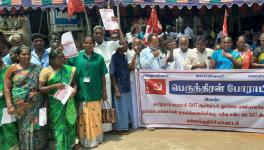Sanitation Workers in Kanyakumari Oppose Outsourcing by Local Bodies
Representational us eonly.
The sanitation workers in the local bodies of the Kanyakumari district are being outsourced.
The local bodies rope in self-help groups (SHG) to carry out the sanitation works within the local body, thereby leaving the workers at the mercy of the SHGs.
The workers, most of whom are women, allege intimidation from the supervisors and increased working hours due to the outsourcing. At the same time, their wages are taken a hit, as the organisation quoting the lowest amount get the contract for sanitation works.
When the workers were expecting permanent jobs after serving for a couple of decades are now forced to fight to stay as at least contract workers.
The workers also demand to abolish the disparity in wages within a district for the same work and ensure equal wages.
The sanitation workers also allege being denied the ex-gratia paid to the frontline workers for their services during the COVID-19 pandemic.
'STOP EXPLOITATION OF WORKERS'
The sanitation works in the 53 town panchayats of the Kanyakumari district are being outsourced. The local bodies call for the expression of interest from the SHGs to carry out the works.
"The outsourcing will increase the already pathetic working conditions of the sanitation workers," said SC Stalin Dhas, district secretary of the Local Body Workers Union.
"We urge the department of urban development to withdraw the outsourcing method being followed now. This move will increase the exploitation of the sanitation workers," he said.
The decreasing number of permanent workers and increasing number of contract and casual workers are causes of concern.
"The change of policies of the union government after 2006 has led to mass contractualisation in the local bodies. Sanitation solid waste management, drivers, park maintainers, drinking water pipe and pump operators are contractualised. These workers have neither ensured minimum wages nor social welfare measures," Stalin Dhas said.
The women workers allege exploitation and intimidation from the individuals appointed by the SHGs to supervise them. Forcing them to carry out hard work, including cleaning deep drainages, they are threatened of losing jobs.
A woman worker said, "The supervisors try to sexually exploit the workers. Several complaints to the officials have not been attended to. They threaten to terminate us from work even if we come late by even five minutes. The supervisors force us to work beyond the working time against which we are fighting through the trade union."
ADMINISTRATION DISTANCING THEMSELVES FROM WORKERS
The workers have been accusing the local body administration of distancing themselves from the issues faced by them during work. The town panchayats paid wages directly to the sanitation workers until 2006, with uniform wages across the district.
Sudalai, a sanitation worker in one of the town panchayat, said, "We opposed the contract work system during the past and oppose the outsourcing pattern implemented now. We cannot live at the mercy of the contractors".
The Centre of Indian Trade Unions (CITU), to which the local body workers' union is affiliated, has been opposing the contract system in the local bodies.
Earlier the executive officer of the town panchayats was recruiting the workers and was responsible for the workers' issues. But now, the workers allege that the local body administration distance itself from the workers and their issues. The local bodies refuse to take responsibility in case of accidents happening during work.
"As the principal employer, the concerned local body must take responsibility for any mishaps at work. The local bodies must ensure the safety of the workers and ensure the supply of protective gears for work," Stalin Dhas said.
'ELIMINATE DISPARITY IN WAGES'
Together with the multiple attacks on their job protection and refusal of social welfare measures, the disparity in wages continues to remain.
"The wages differ from Rs 400 to Rs 600 in the town panchayats within the district. All the sanitation workers are doing the same job, then why such a disparity is prevailing. The state government and district administration must intervene in ensuring equal wage for equal work," Stalin Dhas.
Further, the ex-gratia announced for the front line workers has not been granted to the sanitation workers. "We worked when the pandemic forced all the people to remain within their houses. We worked without worrying for our lives when nobody knew what will be the impact of the pandemic in March 2020. The state government must pay all the sanitation workers with the ex-gratia," Sudalai said.
The policies of the Union government towards the local bodies have affected the workers' livelihoods in the lowest strata of the system, including the sanitation workers.
Get the latest reports & analysis with people's perspective on Protests, movements & deep analytical videos, discussions of the current affairs in your Telegram app. Subscribe to NewsClick's Telegram channel & get Real-Time updates on stories, as they get published on our website.
























